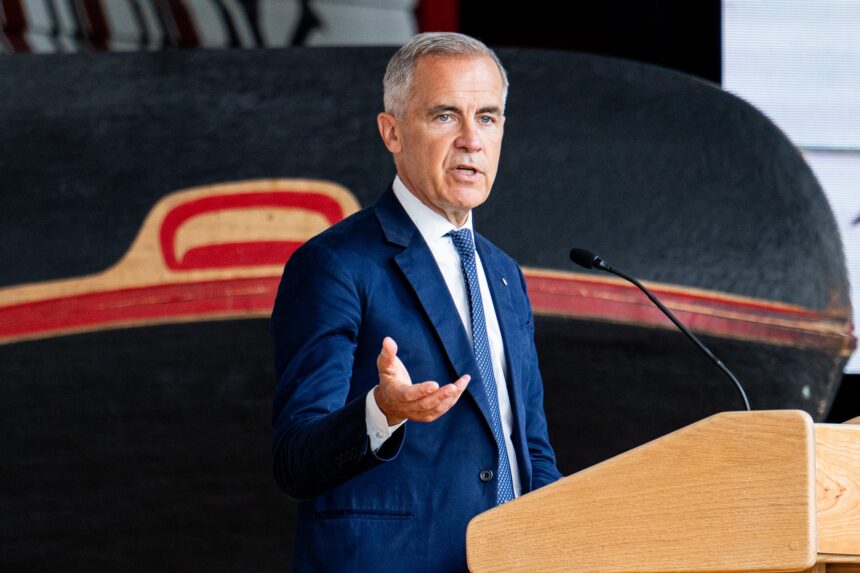In an unprecedented move to reshape Canada’s approach to Indigenous partnerships, Prime Minister Mark Carney has scheduled confidential discussions with Métis Nation leaders aimed at accelerating major infrastructure initiatives across the country. The high-stakes summit, set for next week in Ottawa, represents a significant shift in federal-Indigenous relations and could dramatically alter how major projects proceed through regulatory frameworks.
Sources close to the Prime Minister’s Office confirm that the closed-door session will center on Carney’s controversial “Build Canada Forward” initiative—a cornerstone economic policy that seeks to streamline approvals for critical infrastructure while attempting to balance Indigenous rights and environmental protections. The talks signal a new strategy of direct engagement with specific Indigenous groups rather than through broader consultative bodies.
“This approach fundamentally changes the equation,” explained Dr. Catherine Martinez, Director of Indigenous Policy Studies at the University of Toronto. “By dealing directly with Métis leadership on infrastructure development, the government is creating a potential blueprint for project advancement that could either strengthen or undermine the duty to consult, depending on implementation.”
The Métis National Council, representing approximately 400,000 Métis people across Canada, has indicated cautious optimism about the summit. Council President Cassidy Johnston told CO24 News yesterday that while they welcome direct high-level engagement, substantive outcomes remain their priority.
“We’ve heard promising rhetoric before, but Métis communities need concrete commitments on economic participation, environmental safeguards, and recognition of our unique rights,” Johnston stated. “The Prime Minister’s interest in expediting major projects must not come at the expense of proper consultation and consent.”
Financial analysts monitoring the summit note that billions in potential investment hang in the balance. The Toronto Stock Exchange has already responded positively to rumors of the meeting, with energy and construction stocks seeing modest gains this week. According to CO24 Business analysis, investment confidence in resource development projects has been dampened by regulatory uncertainty—something the Carney government has pledged to address without compromising environmental standards.
Critics, however, have raised significant concerns about the closed nature of the discussions. Opposition Leader Michelle Taylor questioned the transparency of the process during yesterday’s Question Period in Parliament.
“Canadians deserve to know what’s being negotiated behind closed doors,” Taylor remarked. “Fast-tracking major projects sounds suspiciously like cutting corners on environmental reviews and Indigenous consultation—the very protections previous governments worked to strengthen.”
Environmental advocacy groups have similarly expressed alarm. The Canadian Environmental Coalition released a statement emphasizing that “expedited approvals often translate to inadequate impact assessments” and called for public disclosure of any agreements reached.
The Prime Minister’s spokesperson defended the confidential format, telling CO24 Politics, “These initial discussions require a frank and open exchange that respects the nation-to-nation relationship. The outcomes will be communicated transparently once an understanding is reached.”
Industry stakeholders are watching closely. The Canadian Chamber of Commerce has long advocated for regulatory streamlining, citing data showing that major infrastructure projects face an average approval timeline of 4.5 years—significantly longer than many competing jurisdictions.
Métis communities stand to benefit substantially if agreements include provisions for equity participation, revenue sharing, and skills training. Recent precedents in British Columbia and Alberta have demonstrated that meaningful Indigenous economic participation can both accelerate project timelines and distribute benefits more equitably.
Constitutional experts note that the legal landscape has evolved considerably since landmark Supreme Court decisions reinforced the Crown’s duty to consult. Professor James Richardson of McGill University’s Faculty of Law told Canada News that “the government is walking a delicate line between efficiency and legal obligation. The courts have been clear that consultation must be meaningful—not merely procedural.”
As Canada navigates complex economic recovery challenges and ambitious climate commitments, the outcome of next week’s summit may establish a template for how the Carney government approaches resource development and Indigenous relations moving forward. The fundamental question remains: can Canada truly accelerate infrastructure development while honoring Indigenous rights and environmental responsibilities, or will expedience ultimately compromise these principles?










